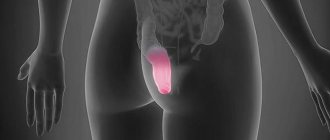Make an appointment Warning signs of anal cancer include rectal pain, itching and bleeding, and changes in bowel movements - this is the first symptom of bowel cancer. Hemorrhoids, which are painful collections of inflamed veins, can cause many of the same symptoms as anal cancer.
Although hemorrhoids are not usually a precursor to cancer—and are much more common—these symptoms should still be brought to the attention of your doctor immediately, who can determine the cause and, if necessary, make an accurate diagnosis. Whatever it is: cancer or hemorrhoids, treatment must be prescribed immediately.
How to distinguish hemorrhoids from cancer
Hemorrhoids and some types of cancer, most notably colon and anal cancer, can cause similar symptoms.
This may cause patients with rectal bleeding or lumps in the anus to think they have cancer. Hemorrhoids are more common than cancer and are the most likely explanation for rectal bleeding or pain. However, it is impossible to make a diagnosis on your own based on symptoms alone, so it is important to consult a doctor.
Hemorrhoids - the first signs
“If we are talking about recognizing the first signs of hemorrhoids, then most often we pay attention to the discharge of blood from the anus during bowel movements,” Abritsova noted in a commentary for FAN. — At a more severe stage of the disease, we may notice prolapse of internal hemorrhoids. Such nodes either retract themselves after defecation, or they must be retracted by hand.
Also a sign of hemorrhoids is the development of thrombosis (formation of a blood clot) of external hemorrhoids, which is signaled by painful sensations in the anus and the presence of a dense formation there. In addition, external hemorrhoids may form and swell after defecation or drinking alcohol.”
According to the doctor, all these signs are clear symptoms of hemorrhoids. Having noticed them in yourself, you should not self-medicate or think that they will “resolve” on their own, but contact a specialist.
Hemorrhoids and Cancer: Key Differences
Hemorrhoids are swollen veins in the rectum and anus. They may become irritated, bleed, hurt, or itch.
Cancer develops due to uncontrolled cell growth. Anal cancer can cause a lump or lump in the rectum or anus, while colon cancer affects the colon and does not cause lumps or lumps that can be felt with the hand.
It is not always possible to distinguish cancer from hemorrhoids.
Symptoms are more likely to be related to hemorrhoids if:
- There are risk factors for hemorrhoids, such as current pregnancy, constipation, history of straining before bowel movements, or a history of hemorrhoids
- symptoms improve with home treatment, eating more fiber, taking sitz baths, or using hemorrhoid creams
- you may feel a swollen lump or just a lump near the anus or see a swollen vein in the mirror
- symptoms come and go but do not gradually worsen or cause other symptoms such as weight loss
It is important to talk to your doctor about changes in your health, as cancer is much easier to treat in its early stages.
Some factors that increase your risk of cancer include:
- age over 50 years
- family history of cancer
- smoking
Measures to prevent hemorrhoids
The main provoking factor in the development of hemorrhoids is a violation of bowel movements (constipation or diarrhea), says Abritsova. Therefore, first of all, it is necessary to treat constipation.
“In addition, hemorrhoidal disease can develop during pregnancy and after childbirth, this happens quite often. This is a separate category of patients that needs the help of proctologists,” noted Maryana Vladimirovna. “Therefore, at the stage of pregnancy planning, it is advisable to consult a proctologist in order to prevent or reduce the risk of developing hemorrhoids during this period.”
Symptoms of cancer
Colon cancer in its early stages often causes no symptoms. This is why regular colon cancer screenings are so important for good health. Some symptoms that you may notice on your own include:
- defecation retention
- blood in stool
- bleeding from the rectum
- a feeling of needing to go to the toilet that does not go away after a bowel movement
- pressure or pain in the stomach
- fatigue or weakness
- a long-term, unexplained change in bowel habits, such as frequent diarrhea or constipation
- unintentional weight loss
- nausea
The most frequently asked questions to a proctologist
What are hemorrhoids?
Hemorrhoids are expansion and overflow with blood of the cavernous (spongy) bodies of the rectum and anal canal, which are a normal anatomical formation. Accordingly, they talk about hemorrhoids only when the cavernous bodies increase in size and begin to make themselves felt.
What are external and internal hemorrhoids and are hemorrhoids always manifested by the presence of formations on the skin around the anus?
Hemorrhoids can be located both outside (external hemorrhoids) and inside the rectum (internal hemorrhoids), which are not visible from the outside.
How do hemorrhoids manifest?
The main manifestations of hemorrhoids are bleeding and prolapse of hemorrhoids. Pain is not typical for chronic hemorrhoids - in this case we are talking about either acute hemorrhoids or other diseases of the rectum. By the way, the discharge of blood from the rectum and the prolapse of any formations do not always indicate hemorrhoids. This diagnosis can only be reliably made by a proctologist after an examination. Hemorrhoids can mask other and often more serious diseases of the rectum.
Why do hemorrhoids occur and how to prevent the development of hemorrhoids?
One of the main factors in the development of hemorrhoids is heredity. Therefore, if your parents suffered from hemorrhoids, then with a certain degree of probability we can say that you may also develop hemorrhoids. Often hemorrhoids are combined with varicose veins of the lower extremities and flat feet, which is a consequence of the congenital weakness of the connective tissue that is the framework of the veins. In addition, risk factors are food addictions (abuse of spicy foods), excessive alcohol consumption, sedentary lifestyle, prolonged stay in the same position (work as a salesperson, hairdresser, manager, etc.), intense physical activity, and people suffering from constipation. Often the first manifestations of hemorrhoids occur during pregnancy. Accordingly, eliminating risk factors for hemorrhoids from your life can prevent the development of hemorrhoids.
What are the complications of hemorrhoids?
Typical complications of hemorrhoids are thrombosis of the hemorrhoid with pain and hemorrhoidal bleeding. Contrary to popular belief, hemorrhoids never turn into cancer (but can mask its presence).
Can hemorrhoids go away on their own?
Hemorrhoids do not tend to shrink, but rather increase over time. Drug treatment slows its progression, and in the case of acute hemorrhoids, only reduces or eliminates its symptoms.
When and how should hemorrhoids be treated?
Only a doctor can prescribe correct and adequate treatment for hemorrhoids. The symptoms of hemorrhoids are very varied and the treatment varies accordingly. In addition, the symptoms you personally have may be caused by other proctological diseases. Treatment depends on the stage and nature of the disease. In addition to drug and surgical treatment, outpatient minimally invasive techniques are currently used, such as photocoagulation, sclerotherapy, ligation (application of latex rings) of hemorrhoids. Their use allows for a cure in a short time with minimal risk of complications. Abroad, only 25% of patients with hemorrhoids undergo surgical treatment, and 75% undergo minimally invasive treatment for hemorrhoids.
What ointments are most effective for treating hemorrhoids?
The symptoms of hemorrhoids are very diverse, and the ointments used have a narrowly targeted effect on certain symptoms of hemorrhoids. Therefore, only a proctologist can choose an effective treatment for hemorrhoids. In addition, it has been proven that topical forms of medications (suppositories and ointments) do not have a therapeutic effect on hemorrhoids, only reducing their manifestations. Therefore, tablet forms of venotonic drugs must be included in the treatment of hemorrhoids.
Can hemorrhoids turn into cancer?
Hemorrhoids never become malignant. However, this does not exclude the simultaneous existence of rectal cancer.
Is it possible to get rid of hemorrhoids without surgery?
Can. Currently, there is a wide arsenal of so-called minimally invasive, non-surgical outpatient methods for treating hemorrhoids. Their advantage is the simplicity, painlessness and ease of procedures for the patient. The patient remains in the usual rhythm of life. However, their use is most effective in the early stages of hemorrhoids. In advanced cases, surgery cannot be avoided.
Who is a coloproctologist?
In accordance with the modern nomenclature of medical specialties, the proctologist has been renamed a coloproctologist, since his competence, in addition to diseases of the rectum (in Greek - proktos), began to include diseases of the large intestine (in Greek - colon).
How often do you need to visit a proctologist?
Naturally, the sooner the patient comes, the easier and more effective his treatment. In addition, there are serious diseases of the rectum that do not appear outwardly. Therefore, the optimum for preventive visits to a proctologist is once a year or at least once every five years. For patients over 50 years of age, patients whose parents suffered from proctological diseases, it is mandatory to visit a proctologist once a year.
What preparation is required before visiting a proctologist?
If you are concerned about intense pain in the rectum or anus, then no preparation is required before the visit. In other cases, it is necessary to administer 2 cleansing enemas the night before and in the morning of the visit. There is an alternative option - a microenema with the ready-to-use drug Microlax in the morning on the day of the visit. Preparation is necessary for a full examination and, if necessary, rectoscopy - examination of the rectum with an apparatus to a depth of 30 cm.
How necessary and painful is rectoscopy?
The method is absolutely necessary for most proctological patients to diagnose possible hidden diseases of the rectum, the only diagnostic method for which is rectoscopy, which allows you to visually examine the intestine and detail the pathological process. The method is painless; moreover, the appearance of pain during the examination is an indication to stop the procedure.
Causes of hemorrhoids
Anyone can get hemorrhoids, and the risk tends to increase with age.
Hemorrhoids can be internal, which means the damaged vein is inside the rectum, or external, which means it is outside the rectum - often at the entrance. Internal hemorrhoids are usually painless, but external hemorrhoids can be painful.
Hemorrhoids occur when a vein in the rectum becomes irritated and inflamed. It increases in size, causing the intestines to rub against it. This may cause pain.
Hemorrhoids occur naturally. Some risk factors include:
- pregnancy, overweight or obesity, as this puts more pressure on the rectum
- constipation or low fiber diet
- straining during bowel movements
- sedentary lifestyle
What is the essence of colorectal cancer?
Early colorectal cancer is malignant tissue that grows inside the body. Tumors often occur when normal tissue forms an adenomatous polyp, or precancerous growth, growing on the lining of the wall. As the polyp grows, a tumor forms. This process can take many years, allowing time for early detection through screening tests.
Studies of colorectal cancer cases have shown that certain lifestyle factors may put a person at higher risk. These factors include:
- eating foods rich in fat and red meat;
- low level of physical activity;
- obesity.
In addition, smoking and excessive alcohol consumption may play a role in the development of the disease.
The common denominator of many of these factors is the possibility of poor circulation in organs. The accumulation of blood in this area can cause the blood vessels to dilate and become inflamed. Additionally, the connective tissues that support the veins can weaken over time, causing the veins to bulge outward. For this reason, the likelihood of developing the disease increases with age.
Causes of cancer
Cancer is a complex disease that does not have a single cause.
Certain risk factors increase your chance of developing anal cancer, including:
- history of human papillomavirus
- smoking
- chronic anal injuries
- age over 55 years
Your chances of getting colon cancer increase if you:
- are overweight or obese
- have a family history of colon cancer
- eat a lot of fried food
- smoke
- drink a lot of alcohol
Genetics may also play a role. People with a family history of cancer may be more likely to develop the disease.
Age also increases the risk of cancer, and most cancers are rare in younger people.
What are hemorrhoids
In simple terms, “hemorrhoids” means a pathological enlargement of hemorrhoids. It is manifested by periodic bleeding from the nodes, their loss from the anal canal and frequent inflammation. The disease can be acute or chronic. Hemorrhoids are quite common, and women often suffer from them during pregnancy and after childbirth.
Among the factors contributing to the development of hemorrhoids, in addition to pregnancy and childbirth, doctors name:
- obesity;
- smoking and alcohol abuse;
- sedentary lifestyle;
- hard physical work;
- frequent bowel movements (constipation or diarrhea) and some other factors.
Some experts also consider constant stress to be a risk factor.
But the opinion that anal sex leads to hemorrhoids is a common myth, which, according to doctors, is not true. However, for those who have already developed hemorrhoids, this type of sexual practice is not recommended.
The Federal News Agency asked proctologist, candidate of medical sciences Maryana Abritsova about some of the “secrets” of hemorrhoids, as well as the fears and myths associated with this disease .
From the archive of Maryana Arbitsova /
Hemorrhoids and cancer: diagnosis
A doctor can usually diagnose hemorrhoids by performing a simple rectal examination and taking a medical history. If he notices an unusual growth that is not associated with hemorrhoids, he may recommend a biopsy to check for anal cancer.
Diagnosing colon cancer is more difficult. This is because cancer markers do not necessarily correlate with the presence or absence of cancer. Therefore, your doctor may also recommend testing based on your symptoms. For example, doctors may ask whether a patient is bleeding but not hemorrhoids, or whether treatment for hemorrhoids does not relieve symptoms.
They may perform a blood test to look for cancer markers or recommend a colonoscopy to look for lumps. A colonoscopy involves inserting a thin, flexible tube into the rectum while the person is asleep or under sedation. If your doctor finds a lump, he or she may test it in a laboratory or recommend a biopsy.
Can hemorrhoids lead to cancer?
The question of whether hemorrhoids can turn into cancer is one of the most common. We asked Maryana Abritsova about this.
“No, hemorrhoids do not lead to cancer, as many people think. This is one of the most common myths,” noted the candidate of medical sciences. — Hemorrhoids are dangerous in another way: by reducing the quality of our life.
Imagine how you will feel when you have intense blood discharge with every bowel movement, hemorrhoids constantly fall out, you experience an unbearable burning sensation in the anus, or your underwear is constantly soiled with feces or mucus.
Therefore, if you notice bleeding from the anus, itching, or you have to straighten something with your hand after defecation, you need to contact a proctologist as soon as possible, and not wait for all this to go away on its own.”
How can you avoid developing hemorrhoids?
There are effective recommendations for preventing hemorrhoidal disease. Competent prevention will be beneficial at any age and will help avoid the occurrence of an uncomfortable and dangerous disease.
The main ways to prevent hemorrhoids:
- Minimum consumption of hot and spicy foods.
- Refusal of non-traditional (anal) sex.
- Moderately active lifestyle.
- Regular training of the pelvic floor muscles.
When the first signs of pathology appear, self-medication should be avoided. Any medications can be used only after examination by a doctor, clarification of the stage of the disease and the characteristics of its course.
Harm from hot and spicy foods
Frequent causes of hemorrhoids in men, as well as in some women, are the constant consumption of hot, spicy foods, and neglect of the principles of a healthy diet. While inside, spicy foods retain their burning effect and increase blood flow to the rectum. Such an effect is perceived negatively by the body and becomes the cause of the development of pathologies in the anal area.
Excessive interest in baths and saunas is considered no less harmful. To avoid irritating the rectum, it is not recommended to take hot baths frequently.
The dangers of sexual experimentation
Regular sex is important for every adult. However, its non-traditional forms are common causes of hemorrhoids in women.
A dangerous consequence of sexual experiments is injury to the mucous membrane and the appearance of anal fissures. Dangerous conditions can also develop, such as separation of the rectum from the ligamentous apparatus. In this case, an emergency surgical operation is required to save a human life.
The right approach to sports
The causes of hemorrhoids in people involved in sports are excessive force loads and frequent lifting of heavy objects. Such factors increase the likelihood of developing pathology tens of times. Proof of this is the identification of hemorrhoids occurring at various stages in 9 out of 10 powerlifters.
Cardio exercises are considered the most useful and safe. The following types of physical activity help prevent hemorrhoidal disease:
- running;
- swimming;
- race walking;
- fitness.
It is not prohibited to work with block simulators. In this case, the load should be set to no more than 10-15 kg.
Pelvic floor muscle training
To increase the tone of the pelvic floor muscles, a special set of Kegel exercises is used. Training promotes better blood supply to the anal area, strengthens the muscles, which become an additional frame for the veins, preventing the stretching of their walls.
Why self-medication is dangerous
Treatment of hemorrhoidal disease with folk or home remedies is not always approved by doctors. Some methods may be unsafe, causing more harm than good.
In most cases, self-medication only makes the situation worse. In order to prevent the rapid progression of pathology, it is strictly not recommended to conduct “experiments” on your body, use dubious lotions, compositions for enemas and irrigations.
Frequent consequences of illiterate therapy are chemical burns and rectal injuries. Treatment for such conditions can be complex and time consuming.
Who is at risk?
Myth 1. With a healthy lifestyle, there is no risk of hemorrhoids.
Alas, both athletes and people who do fitness and take care of themselves come to us. And yet, we cannot offer any real prevention, except for the advice not to push until you turn blue in the toilet (and therefore avoid constipation) and not to sit there for a long time, not to arrange a library, to engage in physical exercises, and the like. Although this does not give a 100% guarantee. We cannot say that, for example, those who sit for hours in the toilet with the phone get sick more than those who do not sit. No one has conducted research on this topic. Therefore, we can only warn.
At birth, the Lord God gave us hemorrhoidal tissue. It forms thickenings in the form of pads, which allow the anal canal to be tightly closed while we are not using it. And during emptying, hemorrhoids protect the anal canal and serve as a kind of soft pad to make the process painless. During life, due to increased load and accumulation of blood, hemorrhoids change and begin to manifest themselves in various pathological conditions - blood, pain, itching. The process can take years. But the lack of proven prevention does not mean that you can eat haphazardly and spend your leisure time lying on the couch with your phone.
Myth 2. Professional drivers take more risks.
Truck drivers and pilots have an increased professional risk. For drivers, this is associated with prolonged sitting, when the outflow of blood from the pelvis is disrupted, as well as with frequently changing intra-abdominal pressure, which occurs during acceleration and braking. As a result, hemodynamics (blood circulation) in the lower body changes. So drive calmly, don’t drive, but rather walk more. Weightlifters and other athletes who experience overload in the abdominal cavity are also at risk.







